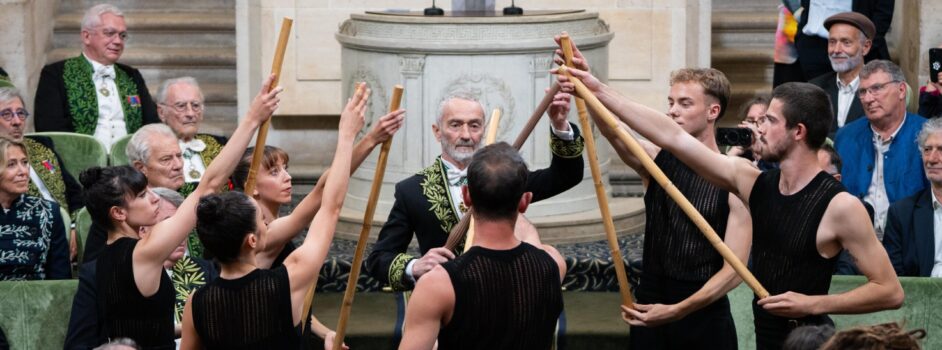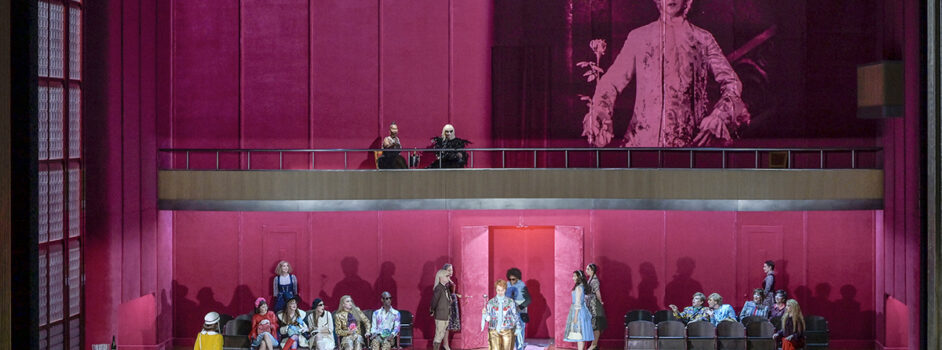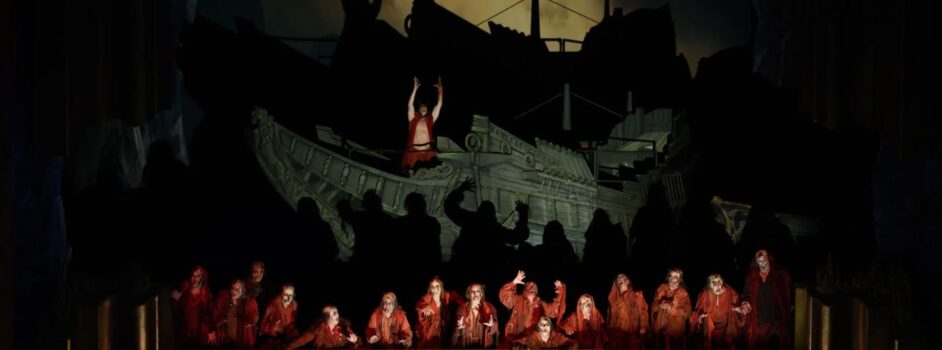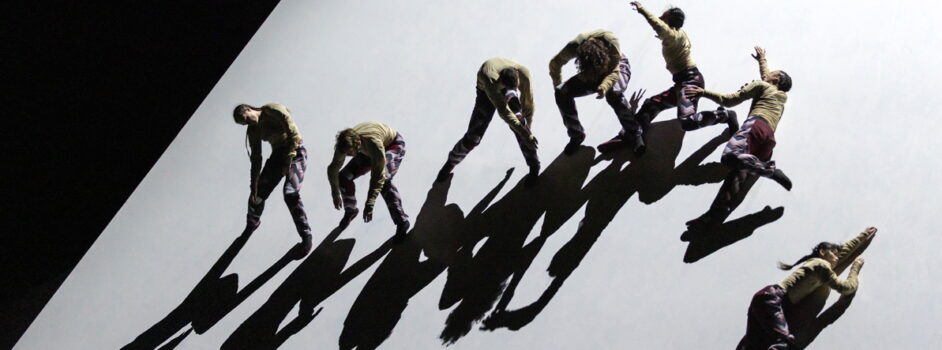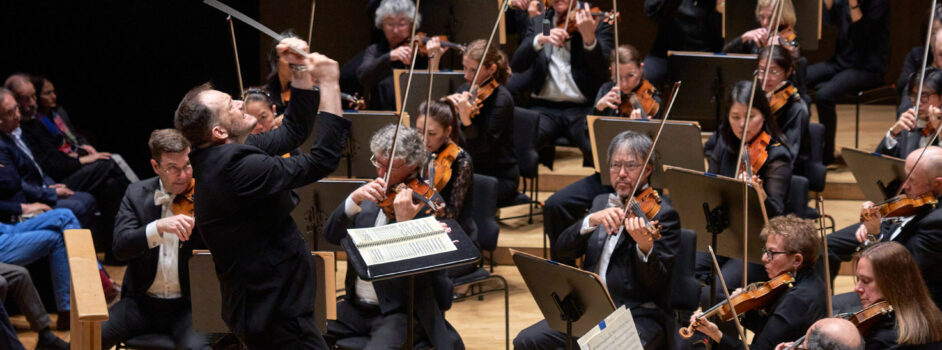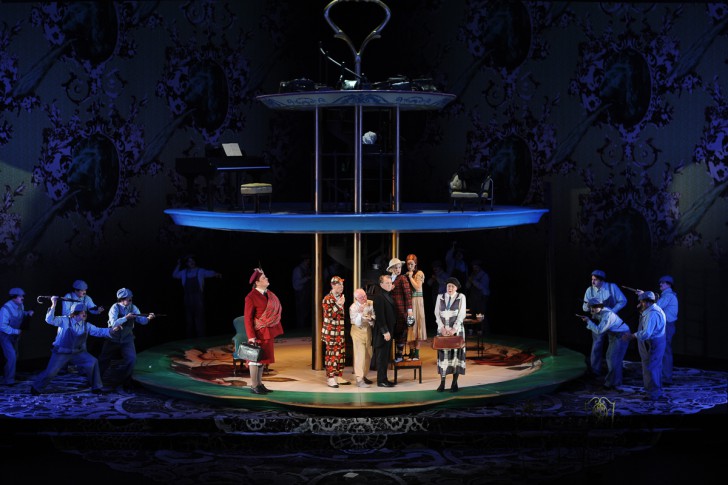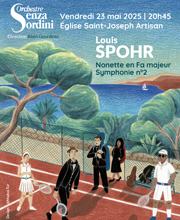Plus de détails
Nancy. Opéra national de Lorraine. 17-III-2013. Gerald Barry (né en 1952) : The Importance of Being Earnest, opéra comique en trois actes sur un livret de Gerald Barry, d’après la pièce éponyme d’Oscar Wilde. Mise en scène : Sam Brown. Décors et costumes : Annemarie Woods. Lumières : D.M. Wood. Chorégraphie : Lorena Randi. Avec : Chad Shelton, John (Jack) Worthing ; Ida Falk Winland, Cecily Cardew ; Phillip Addis, Algernon Moncrieff ; Wendy Dawn Thompson, l’Honorable Gwendolen Fairfax ; Diana Montague, Miss Prism ; Alan Ewing, Lady Bracknell ; José Luis Barreto, Lane/Merriman ; Steven Beard, Révérend Canon Chasuble. Chœur des hommes de l’Opéra national de Lorraine (chef de chœur : Merion Powell), Orchestre symphonique et lyrique de Nancy, direction : Tito Muñoz
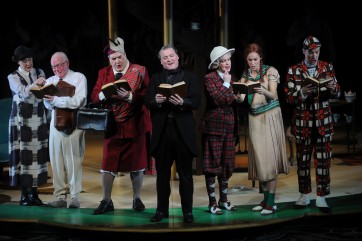 The Opéra de Lorraine, honoring its mission as a “national opera”, is acting as a commissioner of new work, it hosting the premiere of the stage version of Gerald Barry's fifth opera, The Importance of Being Earnest. The work was a originally a commission of the Los Angeles Philharmonic and of London's Barbican Center, but had only been presented in a concert version in 2012, when it was a great success.
The Opéra de Lorraine, honoring its mission as a “national opera”, is acting as a commissioner of new work, it hosting the premiere of the stage version of Gerald Barry's fifth opera, The Importance of Being Earnest. The work was a originally a commission of the Los Angeles Philharmonic and of London's Barbican Center, but had only been presented in a concert version in 2012, when it was a great success.
With his Irish origins—he was born on 28 April 1952 in Clarecastle, county Clare—Gerald Barry could not help tackling the theatrical masterpiece of his fellow countryman Oscar Wilde. The latter's play is indeed a real wonder. Its framework is entirely conventional and includes many misunderstandings and surprising turns of events—such as when Jack, found as an infant in a baggage locker in Victoria Station, turns out to be Lady Bracknell's nephew—which is highly reminiscent of Beaumarchais's Marriage of Figaro. The brilliant dialogue is a constant fireworks display of puns, double entendres, and irony, with hints of the bitter and cynical critcism of the faults in Victorian high society. The main driving force of the plot is thus the homophony between the word earnest and the name Ernest.
Although he has kept only two-thirds of the play, Barry has preserved its essence, notably by attaching importance to the ever-present food. His style is based on persistent and repetitive rhythms, on musical lines passing from one instrument to another and then to the singers, and his disjointed vocal lines and ranges break with opera conventions. Barry sticks very closely to the text, although the rapid tempo of some of the singing deprives the dialogue of much of its charm, especially for listeners who are not native speakers. The harshness of the score reinforce the darkness, the bitterness—and even the violence —underlying Wilde's work, which seems merely lightweight on the surface. Nonetheless, humor is not lost, thanks to the strict and haughty Lady Bracknell (a role taken here by a buffo bass), confined within her convictions of class superiority. In act two, the showdown between Cecily and Gwendolen, via handheld megaphones and smashed crockery, is also quite comical. Lady Bracknell's resorting to German language when angry, and the repeated use of the full three verses of the Ode to Joy seems abstruse and less appropriate. In general, in his music, Barry tends to underline his effects Barry tends to underline his effects, and to draw out some of his musical ideas excessively.
In his staging, Sam Brown shifts the action slightly forward, to the 1920s. Everything happens in a single setting: a gigantic tiered cake stand set upon a gigantic doily. The walls are covered with Victorian wallpaper displaying the British Empire's roaring lion. Annemarie Woods's costumes are as extravagant as they should to depict a society that is so deeply concerned with appearances. It is a challenge to make the intrinsically static dialogue-based scenes more lively, and Brown succeeds in that regard by adding an army of Charlie Chaplin clones (the servants and the chorus) filling the entire stage with activity and constant entrances from every direction.
Even though the score is new and of great difficulty—especially since the vocal lines are often erratic, and the vocal ranges often change, and demand a great deal of falsetto – the cast gets by remarkably well. Chad Shelton portraits an always dignified Jack Worthing, and Phillip Addis, as Algernon Moncrieff, is an extremely realistic dandy. Ida Falk Winland pulls off smoothly the stratospheric high notes of Cecily's part, while Wendy Dawn Thompson seems to suffer somewhat from Gwendolen's wide range. Alan Ewing is hilarious as a vivid Lady Bracknell and Diana Montague's integrity and humanity are touching in the part of Miss Prism.
Congratulations also to the Orchestre symphonique et lyrique de Nancy, which provides the small, almost chamber-scale ensemble, and to its conductor, Tito Muñoz. The work demanded to achieve such results must have been enormous, and the players perform Barry's complex and virtuosic score, which shows off especially the woodwinds and brass, to perfection. The rhythmic drive is ideal, and the solo parts are flawless and eloquent.
Plus de détails
Nancy. Opéra national de Lorraine. 17-III-2013. Gerald Barry (né en 1952) : The Importance of Being Earnest, opéra comique en trois actes sur un livret de Gerald Barry, d’après la pièce éponyme d’Oscar Wilde. Mise en scène : Sam Brown. Décors et costumes : Annemarie Woods. Lumières : D.M. Wood. Chorégraphie : Lorena Randi. Avec : Chad Shelton, John (Jack) Worthing ; Ida Falk Winland, Cecily Cardew ; Phillip Addis, Algernon Moncrieff ; Wendy Dawn Thompson, l’Honorable Gwendolen Fairfax ; Diana Montague, Miss Prism ; Alan Ewing, Lady Bracknell ; José Luis Barreto, Lane/Merriman ; Steven Beard, Révérend Canon Chasuble. Chœur des hommes de l’Opéra national de Lorraine (chef de chœur : Merion Powell), Orchestre symphonique et lyrique de Nancy, direction : Tito Muñoz

